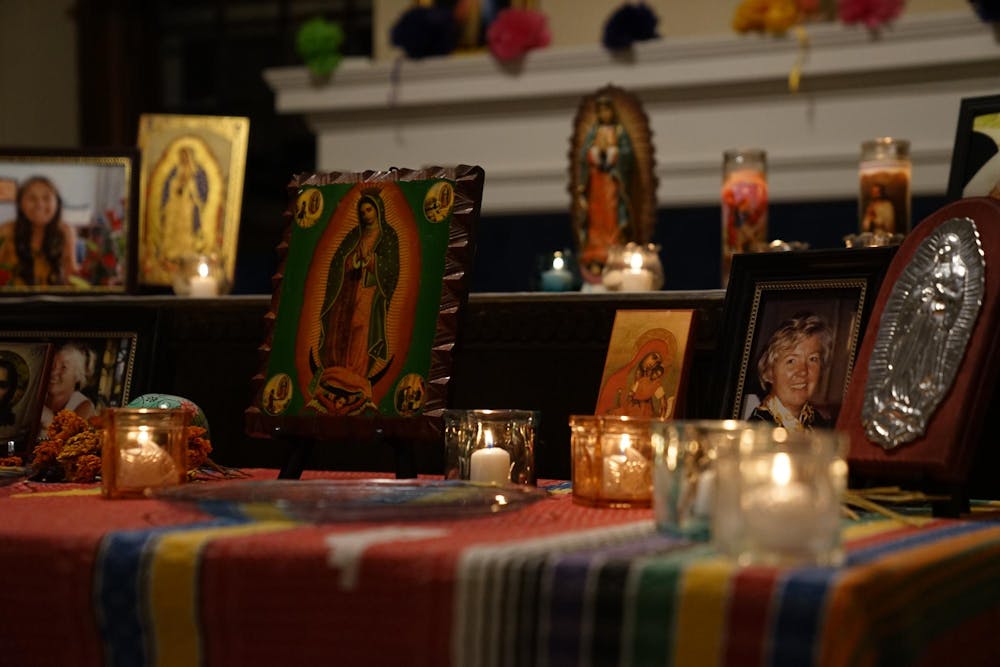Pictures of late friends and family line colorfully decorated tables beside candles, flowers, sugar skulls and food. In the middle, a basket with the words, “write a letter for a loved one you don’t see anymore,” invites students and staff to connect with spirits of their past.
Students and pedestrians could see these ofrendas Wednesday night when walking through the buildings of La Casa Latino Cultural Center, First Nations Educational and Cultural Center, Canterbury House and the LGBTQ+ Culture Center. Each year, they all open their doors to those wishing to celebrate Día de los Muertos.
Día de los Muertos, or Day of the Dead, originated from an Aztec festival honoring a goddess named Mictecacihuatl, the Lady of the Dead. Believed to guard the bones of the deceased, she embodies a culture that views death as a transitionary phase: A culture that believed souls could visit the living. This belief shaped the Mexican tradition.
While the holiday takes place Friday and Saturday, families spend the days before preparing the ofrendas and cooking; this is something students far from home often miss. For IU freshman Isabella Connelly, visiting the four centers allowed her to connect with her family from a distance.
“I celebrate with my mom, dad and sister. We would take the time to create our ofrenda at home, and my mom would put so much effort into it,” Connelly said. “I was sad that I couldn’t be home, but just coming into these houses made me feel more at home and more in touch with my culture.”
Aside from the ofrendas and decorations adorning the houses, the smell of home-cooked food floated through the air. Each house offered Arroz con leche, Pan de Muertos, horchata and other traditional Mexican dishes. It is common to include the favorite foods of the deceased on the ofrendas, because they are believed to nourish the souls of the departed after their journey back home. IU freshman Giovanni Espinosa said the food brought back fond memories.
“My favorite part of the event has been the food,” Espinosa said. “I kind of just miss having actual food I usually eat at home.”
For Espinosa and Connelly, celebrating Día de los Muertos is an annual tradition. Others, like junior Brian Cabrao, are still exploring this aspect of his heritage.
“I'm half Mexican and half Venezuelan,” Cabrao said. “In my household, we don't really celebrate Mexican culture, so this is a moment for me to be Mexican.”
The effort to bring Día de los Muertos to campus has not only been recognized by those who share a similar cultural background but by other students as well. Junior Dayanara Alvarado does not celebrate the holiday but appreciates the experience.
“I like going to the different cultural centers and seeing how other people honor their loved ones and deliver remembrance,” Alvarado said. “I also like the altars they create and the food.”
Sophomore Luke Jackson is president of Canterbury House, an Episcopal campus ministry located next to La Casa. He recognized the impact this event had on the community and cultural center itself.
“It’s been awesome to see all kinds of people who share not so much of an identity but can still celebrate something together,” Jackson said. “Also just seeing a lot more traffic at Canterbury House than normal has been my favorite part of the event.”
As more people stepped into the houses of these four cultural centers, the more the baskets at the ofrendas filled up with letters, aiding in guiding the souls back home. At midnight Thursday, the gates separating the living from the dead will open, first sending the spirits of children to rejoin their family. On Saturday, the spirits of adults will do the same. IU freshman Luciana Anon believes everyone should understand the importance of this holiday.
“I think it’s just important, even if you’re not Hispanic,” Anon said. “The meaning behind it is beautiful, like the fact that you still need to remember your loved ones after they’re gone, but in a happier way.”




